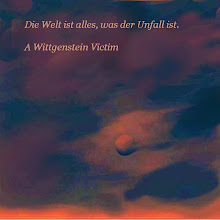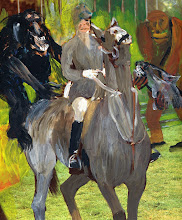“To read, to write, the way one lives under surveillance of the disaster: exposed to the passivity that is outside passion. The heightening of forgetfulness.
It is not you who will speak; let the disaster speak in you, even if it be by your forgetfulness or silence.” (Maurice Blanchot, The Writing of the Disaster)
I had wanted to write my previous posts It’s like Shooting Elephants Parts I-III under the star of Blanchot and The Writing of the Disaster – but I forgot. That is also the essence of Blanchot and the disaster – “The disaster is related to forgetfulness – forgetful without memory, the motionless retreat of what has not been treated – the immemorial, perhaps. To remember forgetfully: again, the outside.” But not just forgetfulness – when the overwhelming force of the void which is biopolitics and physis (or maybe hypophysics - another name for philosophical eugenics) kidnaps thought or the collective intellect (mine included) – it possesses and gorges itself on the body and air of all thought and experience like the Leviathan itself. And you don’t even notice it.
But as Proust writes – instinct or the unconscious is stronger than thought or intellect – that is where ‘safety’ or ‘immunity’ or conatus and especially art reside. “Everyday I set less store on intellect.” (Marcel Proust, Contre Saint-Beuve) Occasionally in sudden moments of enlightenment after extravagant futile labours of the mind (post intellect) – one can experience one of those Proustian moments of ‘resurrection’. A scribbled note unleashes an inner tremor in me – I open Blanchot’s The Writing of the Disaster and find another marginalia “I already wrote – You, I and they the ‘rulers’ speak as the virus – the virus speaks through them – the rat dies and gasps its last breath in the Hofmannsthal narrator – one is the disaster’s gift to itself. (22nd April 2020)” More perplexity – what rat, which Hofmannsthal? I have no recollection of having read anything by Hofmannsthal nor about a rat lately. In A Thousand Plateaus Deleuze and Guattari speak of their fondness for a certain rat in cinema – but that’s the only rat I can remember. As a last resort I google ‘Hofmannsthal rat’ — thank Google I can continue my Proustian epiphany. I find the rat – in Hofmannsthal's Letter to Lord Chandos.
Here is the passage in its entirety so as not to stifle its magic power:
“Recently, for instance, I had given the order for a copious supply of rat-poison to be scattered in the milk cellars of one of my dairy-farms. Towards evening I had gone off for a ride and, as you can imagine, thought no more about it. As I was trotting along over the freshly-ploughed land, nothing more alarming in sight than a scared covey of quail and, in the distance, the great sun sinking over the undulating fields, there suddenly loomed up before me the vision of that cellar, resounding with the death-struggle of a mob of rats. I felt everything within me: the cool, musty air of the cellar filled with the sweet and pungent reek of poison, and the yelling of the death cries breaking against the mouldering walls; the vain convulsions of those convoluted bodies as they tear about in confusion and despair; their frenzied search for escape, and the grimace of icy rage when a couple collide with one another at a blocked-up crevice. But why seek again for words which I have foresworn! You remember, my friend, the wonderful description in Livy of the hours preceding the destruction of Alba Longa: when the crowds stray aimlessly through the streets which they are to see no more . . . when they bid farewell to the stones beneath their feet. I assure you, my friend, I carried this vision within me, and the vision of burning Carthage, too; but there was more, something more divine, more bestial; and it was the Present, the fullest, most exalted Present. There was a mother, surrounded by her young in their agony of death; but her gaze was cast neither toward the dying nor upon the merciless walls of stone, but into the void, or through the void into Infinity, accompanying this gaze with a gnashing of teeth! A slave struck with helpless terror standing near the petrifying Niobe must have experienced what I experienced when, within me, the soul of this animal bared its teeth to its monstrous fate.” (Hugo von Hofmannsthal, Letter to Lord Chandos)
“Recently, for instance, I had given the order for a copious supply of rat-poison to be scattered in the milk cellars of one of my dairy-farms. Towards evening I had gone off for a ride and, as you can imagine, thought no more about it. As I was trotting along over the freshly-ploughed land, nothing more alarming in sight than a scared covey of quail and, in the distance, the great sun sinking over the undulating fields, there suddenly loomed up before me the vision of that cellar, resounding with the death-struggle of a mob of rats. I felt everything within me: the cool, musty air of the cellar filled with the sweet and pungent reek of poison, and the yelling of the death cries breaking against the mouldering walls; the vain convulsions of those convoluted bodies as they tear about in confusion and despair; their frenzied search for escape, and the grimace of icy rage when a couple collide with one another at a blocked-up crevice. But why seek again for words which I have foresworn! You remember, my friend, the wonderful description in Livy of the hours preceding the destruction of Alba Longa: when the crowds stray aimlessly through the streets which they are to see no more . . . when they bid farewell to the stones beneath their feet. I assure you, my friend, I carried this vision within me, and the vision of burning Carthage, too; but there was more, something more divine, more bestial; and it was the Present, the fullest, most exalted Present. There was a mother, surrounded by her young in their agony of death; but her gaze was cast neither toward the dying nor upon the merciless walls of stone, but into the void, or through the void into Infinity, accompanying this gaze with a gnashing of teeth! A slave struck with helpless terror standing near the petrifying Niobe must have experienced what I experienced when, within me, the soul of this animal bared its teeth to its monstrous fate.” (Hugo von Hofmannsthal, Letter to Lord Chandos)
Although the whole associative train leading me to Hofmannsthal’s dying rats has vanished – the vision of their being poisoned and convulsing in their mass death in the cellar of the narrator’s dairy farm may have carried over in my unconscious. Like Proust’s memories resurrected from a tea soaked rusk – but in a more sinister key - my own forgotten desire to incorporate Blanchot’s The Writing of the Disaster in my post It’s like Shooting Elephants … was submerged, embalmed and mummified in 2 unassuming objects - 2 photos, one of a dead rat the other of a drowning rat. I had included them in my post without really knowing why.
The rat photos are the mausoleums of my forgotten, lost, near dead Blanchot-inspired sensations and perceptions …
 |
| Hypophysics |
The rat of course is the plague symbol and carrier par excellence – so some Freudian overdetermination is also at work. But like in the Letter to Lord Chandos I speak from within the rat – or the rat speaks within me – is that not the same thing?


























.jpg)













